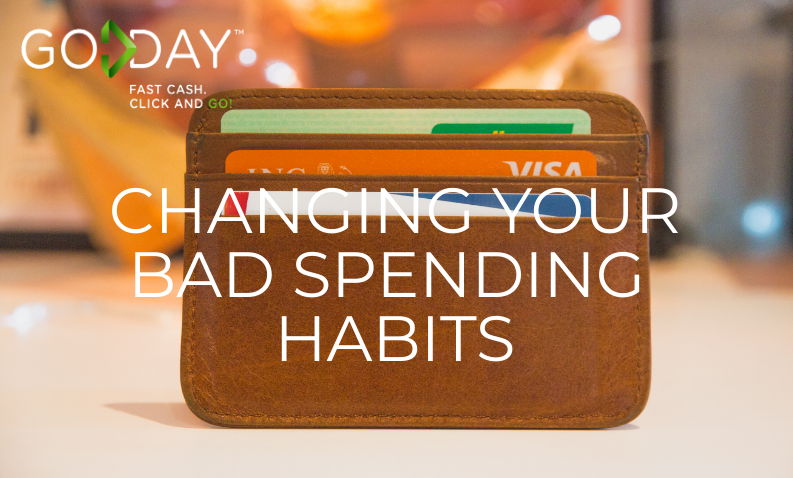
What would you say is your worst spending habit? Do you spend the bulk of your money on a specific item each month, like Starbucks? Or worse, you don’t have any idea where all your money goes?
Everyone has bad spending habits. They can be caused by a variety of things, depending on your lifestyle and interests. However, bad spending habits often allude to bad saving habits. As much as we would all like to spend instead of saving. However, saving should always be the priority.
So how do you get into good savings habits? It starts by breaking your bad spending habits. Here are some of the most common spending habits we hear about:
The Convenience Factor
No time to cook? You opt for something quick, instead of preparing a meal at home. Whether it’s ordering in, taking out, going to a restaurant, or getting a to-go order, convenience can lead to bad spending habits. How do you break this habit? Practice.
You will need to work at it to create a better habit. You can get organized, pre-prep meals, and shop ahead. Prepare a shopping list based on what you will make for the week. Meal planners are a great resource and there are literally thousands of them online. They offer easy to make meals and complete shopping lists. If you make too much, you an use the leftovers for lunches. Alternatively, you an freeze the extra for another dinner.
Pick a day to do your weekly shopping and stick to your list. Once you get home, dedicate several hours to meal preparation. That’s it! Every day you’ll have food ready and you’ll be less tempted to fall for convenient options, since it is already so convenient.
Tips to Optimize Meal Planning:
These helpful tips can help you get the most out of meal planning and build healthier habits:
- Stock your pantry, fridge & freezer
Stockpile staples in your pantry, fridge and freezer. Think long-lasting flavourful or nutrient-dense items like rice, pasta, beans, canned tomatoes and sauce, soups, frozen veggies, etc. These staples can easily be incorporated into a lot of recipes, and when you catch them on sale or buy in bulk, you can save.
- Simplify your planning process with themes
To keep things easy, assign a category based on days of the week like Meatless Monday, Taco Tuesday, Crockpot Wednesday, etc. and mix the recipes up each week to keep things exciting.
- Plan a weekly cleanout
Plan one night of your week to eat any leftovers or a frozen meal. Alternatively, create a new dish with any food items that would end up in the compost or garbage otherwise.
- Order groceries online
You don’t need to leave the comfort of your home to shop nowadays. Most major food chains offer online shopping and you can save your shopping list too. This makes shopping faster and simpler and you’re less likely to buy unnecessary items.
- Double recipes when possible
This way you can eat the leftovers, pack them for lunch, or freeze them so you can have a quick and easy meal in a few weeks.
Don’t Put Off Debts Until Later
Do you keep track of your spending throughout the month? Do you use your credit card for so many purchases you have no idea how much you’ll owe? This is a dangerous habit as it can lead to enormous debt.
Instead, stick to your budget and plan your buys. Check your credit card account regularly to ensure you’re on track too. You don’t need to wait until you receive a monthly statement to discover you’ve overspent.
If you do overspend, cut back in other budget areas. Then use cash or debit for all purchases. This can get you back on track quickly, since you can’t spend what you don’t have in your bank account.
Don’t Justify Unnecessary Expenses
Making excuses for spending money on non-essentials isn’t going to help you break a bad habit. Instead, think “Is this something I need”? Consider what you already own and whether you use it instead of buying something new.
Remember, there is a huge difference between something you want and something you need. This is of prime importance if you want to improve your financial situation and save more.
Financial wants are the items and things we desire, compared to our financial needs which are the obligations we have such as bills, debts, groceries, etc. Unfortunately, needs are often things that don’t really give us much gratification. Nonetheless, they must remain a priority.
Conversely, wants can often give us a surge of satisfaction (until we realize the impact they’ve had on our finances). Additionally, the thrill of buying a want often fades quickly, especially when it is something trendy like the latest iPhone.
Luckily, this doesn’t mean that you can’t have wants too. It’s about striking a balance that works within your budget. If it doesn’t fit within your budget, and you still want it, then set-up a plan to save the money for it each week/month/year until you have enough to buy, rather than going into debt.
You Can Treat Yourself
Certainly, you do deserve special treatment at times, providing it is handled properly. Everyone splurges now and again, but it doesn’t have to be on expensive things that break the bank. Regardless, you must ensure you have the funds to do so and do it sparingly. Celebrate important occasions and accomplishments, but stay within your budget.
Simple Things You Can Do Today
There are so many simple changes we can make that will help us save money. You may be throwing away money and not even realize it. Here are some simple things you can change today that can help you improve your spending habits.
1. Stop using your credit card for everyday purchases
Unless you have fantastic financial control, you shouldn’t use your credit card for your everyday purchases like gas and groceries. We say “unless”, because sometimes it can be beneficial for you to use a rewards credit card which offers cash back or discounts on merchandise.
If you think you can control your finances, here’s the test. Pay off the balance you put onto your card for these every day purchases immediately. Don’t wait until tomorrow, next week, or pay day. If you budgeted the cash for it and it’s sitting in your bank account already. Pay the bill. You’ll avoid the interest and stick to your budget.
If you already have a large balance on your credit card, this is not for you. Pay with a debit card.
2. Don’t make online purchases that aren’t included in your budget
It is really, really hard to avoid deals when marketing arrives on your phone every day. If you find yourself over-spending, because of “sales” on items you don’t need through your favourite retailers, do yourself a favour. Unsubscribe. Stick with flyer and discount sites that can send you alerts on items you use regularly.
3. Return or exchange items
We know time is precious, but do yourself a favour and return items that you don’t like. Are the pants you bought too big or small? Bring them back and exchange them for the right size or get a refund.
If you had an impulse for a huge spending spree, you may feel guilty now. Return the items right away! If at any point you don’t want or need what you just purchased, you’ll be a lot happier (and richer) with the money in your pocket again.
4. Look for deals and discounts
LivingSocial.com and other “Groupon-esque” type websites are amazing, aren’t they? Flyers are great, too. Store sales, even better. If you have the time to shop, you have the time to “pre-shop”.
Impulse shopping, can add up quickly. Look for discounts on things you need regularly. We’re not saying you have to go full-on couponing, but waiting a day for sale is an easy way to save.
5. Don’t go over limits
Whoops – your $10 lunch just became $45 + $10, because of your bank’s overdraft fee policy. Or, whoops – your $10 lunch just became a $29 + $10 lunch, because of your credit card’s overlimit policy. That is a lot of money for just one slip up.
If you can, try to get an automatic account transfer that covers any accidental overages. Some banks will allow you to set up a transfer from one banking account to another to avoid this unnecessary expense.
6. Avoid ATM Fees through other financial institutions
How many times do you actually use your own bank’s network of ATM’s? Do you even think about it, or do you draw cash from the most convenient machine?
If you decide to withdraw from a machine outside of your bank’s network, it could cost you $2 a pop, or more. Some independent cash machines charge as much as $5 per transaction.
That might be fine in a pinch, but it’s not a good habit. You’re basically flushing your money down the toilet. For instance, if you take out cash once a week at an average of $2 per transaction, that’s $104 completely wasted! Considering most Canadian banks already charge you fees, you’re adding insult to injury.
7. Avoid Late Fees
Save yourself the time and hassle by paying your bills automatically. Late fees add up fast and you’ll pay interest on them too. Set up a pre-authorized debit for your biggest bills and budget for them to come out either on their due date or beforehand on your pay day.
8. Consider House or Generic Products
Do you really need to buy a specific brand name when the generic or house brand does the job just as well?
Unless there is defined value in using brand name over a generic or house brand, save yourself some money. You could save 20 percent on your purchases with little effort.
9. Buy Fewer Lotto Tickets
Look – we get it. You want to get rich quick and maybe the lottery is a fun way to relieve stress. But, if you’re spending even $5 a week on a ticket, that adds up fast. Unless you’re making a full return each time and getting your investment back, chances are you’re wasting money.
Yes, it’s a discretionary thing and your right to do. However, just think how quickly that money could build in a savings account instead. If lottery tickets are you only small pleasure, try buying less often.
10. Buy groceries
You’re busy. Sometimes it’s easier to just run out and grab a burger, right? It might be easier, but it’s certainly not cheaper, by a long shot.
If you are buying even just one meal out every day, you’re spending a significant amount. If your grocery budget is a modest $60 a week for yourself and you spend around $10 per day on coffee/lunch, that’s your grocery budget gone.
Instead, buy groceries and try to limit your dining out to once a week. If you can stomach it, only dine out once a month as a special treat. You’ll feel so much better when you see your debts going down or money in your bank account.
What are some of your biggest tips for changing your spending habits? Share below and don’t forget you can get fast loans in Canada at GoDay when you need an extra boost to help get you by.



